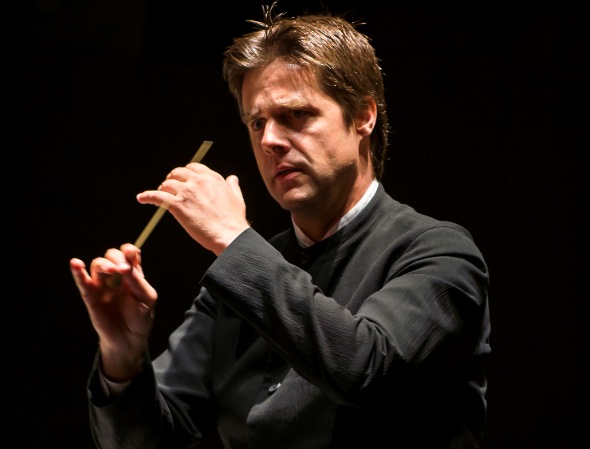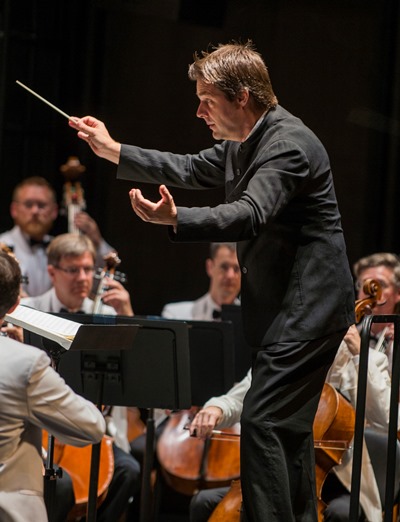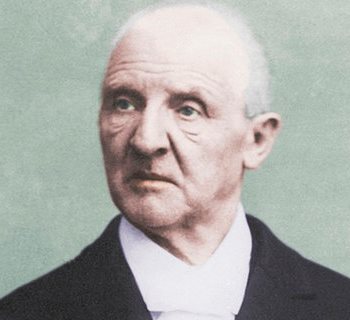Back on Grant Park podium, Christoph König revisits Bruckner with ‘Romantic’ Symphony
 Interview: German conductor attributes the Fourth Symphony’s enduring popularity to its serene drama. Concerts July 15-16.
Interview: German conductor attributes the Fourth Symphony’s enduring popularity to its serene drama. Concerts July 15-16.
By Lawrence B. Johnson
Anton Bruckner’s Symphony No. 4 (“Romantic”) was the Austrian composer’s break-out work, the one that critics and audiences in late 19th-century Vienna finally took to their hearts. It has remained Bruckner’s most popular symphony, and conductor Christoph König can give you a thousand reasons why.
Konig, who led the Grant Park Orchestra in Bruckner’s Sixth Symphony last summer, returns to preside over the monumental and splendorous Fourth in free concerts July 15 and 16 at Pritzker Pavilion in Millennium Park.
 “Actually, one could go on for hours about the many qualities of the Fourth Symphony,” says the 48-year-old German maestro, “but what you find within these features is a very brave composer who believed in the inner drama of music. If you compare the symphonies of Bruckner with those of Mahler, or even Beethoven, there is a sense of extreme drama in those composers that you do not find in Bruckner.
“Actually, one could go on for hours about the many qualities of the Fourth Symphony,” says the 48-year-old German maestro, “but what you find within these features is a very brave composer who believed in the inner drama of music. If you compare the symphonies of Bruckner with those of Mahler, or even Beethoven, there is a sense of extreme drama in those composers that you do not find in Bruckner.
“His music is so expansive and patient. The solo viola prayer in the second movement of the Fourth Symphony goes on for ages. It concentrates everyone’s attention. And then you have, in the scherzo with its hunting theme in the horns, one of Bruckner’s strongest statements. It is quite thrilling.”
Like most of Bruckner’s symphonies, the Fourth went through several revisions generally prompted by the sharp criticisms of conductors and other musical colleagues. When the original version (1874) got a largely negative response, the composer labored over alterations for the next seven years before the work was re-introduced to great acclaim.
König says Bruckner’s reworking was entirely warranted: “At some point, I want to give a concert in which I conduct the first version, then this version, and then you will see how Bruckner was struggling. The original Fourth Symphony was partly not very good.”
Getting at the heart of a Bruckner symphony, says König, is not strictly a matter of technical virtuosity. Even for an experienced orchestra, the connection ultimately comes at a spiritual level.
 “In a work like the Fourth Symphony, we find these sudden tremendous shifts from fortissimo down to pianissimo, but it is much more than that,” he says. “This change should also be accompaniment by something that alters within us, a change in our souls. That’s where the true expression lies in Bruckner.”
“In a work like the Fourth Symphony, we find these sudden tremendous shifts from fortissimo down to pianissimo, but it is much more than that,” he says. “This change should also be accompaniment by something that alters within us, a change in our souls. That’s where the true expression lies in Bruckner.”
These performances of the Fourth Symphony face the familiar open-air challenge that König and the Grant Park Orchestra were spared in their glorious Bruckner Sixth last summer. That venture reveled in the intimacy and quiet of the Harris Theater, an escape from the simultaneous outdoor festivities of Lollapolooza. Yet the conductor insists there’s an upside to engaging Bruckner al fresco.
“To sit at an open-air concert is always enjoyable,” he says. “The atmosphere is fantastic. Yes, you sometimes have helicopters hovering overhead and the police sirens, but what you perhaps lose in artistic possibilities on stage you gain in the attention of so many thousands of people who are focused on the music.
“And I must also say that Chicago is a Bruckner town. I feel a great response to his music here, which seems to be true generally in the U.S. but not so much in other English-speaking countries. In England and Australia, you don’t find this level of enthusiasm, either from the public or from major orchestras. Maybe it’s because there’s a strong sense of German heritage in America. I can’t really explain it, but the difference is real.”
As preface to Bruckner’s grand symphony, König will open his program with the transparency and wit of Haydn’s Symphony No. 55 in E-flat (“The Schoolmaster”).
“Both symphonies are in the same key and there’s a bit of hunting element in the Haydn, as well,” says the maestro. “The 55th Symphony is typical of Haydn, full of surprises and little jokes. I’m not sure we speak Haydn’s language any more. We speak Hollywood music – and Rachmaninoff, Mahler, Strauss. But there’s a marvelous clarity in Haydn’s music that’s special and rare.”
Related Links:
- Performance location, dates and times: Details at GrantParkMusicFestival.com
- Review of König’s Bruckner Sixth with the Grant Park Orchestra: Read it at ChicagoOntheAisle.com

